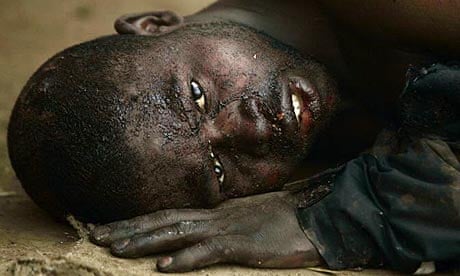No one in Cleveland squatter camp seemed to know the names of the five burned or bludgeoned bodies. They were referred to simply as Zimbabweans, though no one could even be sure they were that.
It was enough that they were foreigners accused of taking jobs, houses and women - or of leading a crime wave - by the mobs that killed them and drove hundreds of others from their homes. About 50 people were taken to hospital with gunshot and stab wounds as the gangs smashed their way in to the dozen or so foreign-owned shops in Cleveland, in the south of Johannesburg.
"It is unfortunate that people got killed," said one of a group of young men lounging on a main street who gave his name only as PK. "But they had to go. They do not belong here taking jobs. Let them go back to Zimbabwe and solve their own problems instead of bringing them here. We have enough problems of our own."
The surviving foreign residents of Cleveland have joined at least 10,000 other immigrants seeking refuge in police stations and churches as xenophobic murders, rapes and other violence spread across the city and its satellite townships on Monday.
At least 22 people have been killed, including two men who it was reported had their throats cut in Tembisa township yesterday and others who have been burned alive, beaten to death or shot, in the worst violence to hit Johannesburg since the politically-driven killings of the final years of apartheid.
In the city centre at the weekend, marauding gangs of men stopped people in the street or in minibus taxis to interrogate them about their origins. Those who did not speak an indigenous language were beaten up.
Some South Africans in the afflicted areas have taken to painting their names on their doors so they are not mistaken for foreigners although some of the mobs have also targeted South Africans speaking minority languages such as Shangaans and Venda.
Much of the violence is driven by resentment of three million Zimbabweans who have fled the crisis in their own country in search of work. But the government's critics say the attacks are also a result of its failure to deliver jobs and significantly better conditions for the mass of urban poor while a ruling elite has got rich - leaving black South Africans to compete with the flood of immigrants from across the continent for jobs and housing.
Cleveland was a popular place for Zimbabweans to settle. Grace Muzenda arrived with her two young daughters three years ago. She left on Sunday.
"They surrounded my place and they were shouting for me to come out. I was crying and telling them I have my babies in here, they mustn't hurt them. But they weren't listening. They were making too much noise. I think some of them were drunk," she said.
"Then they set a fire to force me out. I thought they were going to kill me but they were laughing at the fire and dancing. A few of them hit me but I was able to run. They were shouting to me to go home and never come back. Everything is gone. What do I do? I can't go back to Zimbabwe and I can't stay here."
Yesterday, the police fought running battles with mobs armed with petrol bombs as the violence spread.
Two schoolchildren were among four dead in Primrose squatter camp on the East Rand as large mobs of young men and some women armed themselves with iron bars, spears and clubs, known locally as knobkerries, to hunt foreigners and burn their homes. Hundreds of Zimbabweans and Mozambicans gathered beside a main road just beyond the Makausi squatter camp there to watch helplessly as their shacks and possessions were destroyed.
Not far away, in Reiger Park, the police recovered the body of a Malawian man who was chopped up and burned. Another man, who has still not been identified, was barely alive after a mob threw a burning mattress on to him. He appeared to have been beaten with a concrete pillar first. Two other people, one of them identified as Mozambican from the papers in his pocket, were killed there as scores of shacks were burned.
One person was also killed in the badly crowded Alexandra township in Johannesburg on Monday, where the violence began a week ago with the murder of two immigrants. More than 1,000 people - Mozambicans, Malawians, Zimbabweans - are sheltering in Alexandra's police station.
Over the weekend, the violence spread to the heart of Johannesburg, including poorer residential areas crowded with African immigrants. Street traders were beaten up on the streets and their goods stolen. Gangs went through blocks of flats banging on doors, identifying foreigners and ordering them to leave without their belongings, which were then looted.
Many of the homeless headed for the central methodist church which was also threatened by the mobs. The church's bishop, Paul Veryn, said: "We consider that the situation is getting so serious that the police can no longer control it."
The police said they have arrested more than 200 people for violence, robbery and rape. Many of the foreigners are not surprised at what has been unleashed against them. Hostility to Africans from other parts of the continent has long been rife in South Africa but has escalated with the arrival of the Zimbabweans who are popular with local employers because many are well educated, speak good English and are seen as working harder than South Africans.
Seven people were murdered in March, including a Somali, Zimbabweans and Pakistanis, in attacks near Pretoria. In January, two Somali shop owners were killed in the Eastern Cape.
"They always hated us," said Muzenda. "We thought this might happen."
